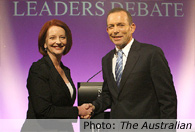In June, Prime Minister Julia Gillard declared that she does not personally support legalising gay marriage in Australia and that her party's policy on same-sex marriage will remain the same under her prime ministership.

Last Friday she told The Australian newspaper she rejected same-sex weddings because "the marriage act has a special status in our culture", adding that she appreciated "our heritage as a Christian country".
"My position is – and it's the Labor Party's position – that for this nation, with our heritage as a Christian country, with what's defined us and continues to define us, the Marriage Act has a special status in our culture and for our community. My position appreciates that," she said.
Australians go to the polls on Saturday in what is predicted to be one of the closest battles in decades. Some analysts have raised the possibility of a hung Parliament – an event not seen in Australia since 1940. The latest Newspoll showed a 50-50 percent split between Gillard’s Labor Party and opposition leader Tony Abbott’s Liberal-National coalition.
Gillard, an unmarried atheist who lives with her male partner, became Australia’s first female prime minister by seizing control of her party from her former boss Kevin Rudd on June 24 and called elections weeks later.
She faces Abbott, a former trainee priest who is said to be a staunch Catholic family man, also opposes same-sex marriage and that marriage should only be between a man and a woman.
Australian Marriage Equality National Secretary, Peter Furness, said Spain, Portugal, Argentina, Mexico and all other countries that allow same-sex marriages have a much longer "Christian heritage" than Australia.
"We demand Julia Gillard explain what Australia's "Christian heritage" has to do with same-sex marriage – does she believe discrimination is acceptable because some people think homosexuality is a sin, or because a minority of couples still marry in churches even though marriage is a civil, secular institution in Australian society?" Furness said in a press statement.
He added: "We demand to know how far Gillard will go in the name of our "Christian heritage" - will she outlaw divorce and interracial marriages, recriminalise homosexuality and abortion, suppress atheism, and remove herself and all other women from leadership roles?"
"Anyway you look at it, Gillard's statement is offensive, ridiculous and extreme and must be explained or withdrawn."
Meanwhile former Labor leader Mark Latham last week said he regretted supporting the Howard Government’s ban on gay marriage in 2004 for fear of being denounced by parish priests.
Speaking on the Austereo network on Monday, Latham said it was the power of churches that compelled him to not support marriage equality.
“I regret the fact that in 2004 I didn’t tell the churches to go get nicked and Labor had a policy of allowing gay marriages. Most people who are reasonable about it recognise that love is the important thing,” Latham said.
“Unfortunately parties are scared of the churches. If you’re running for office, you don’t want some parish priest denouncing you from the pulpit on Sunday before the election ... It’s that power of the churches that holds it back.”
Australia currently has civil unions in the Australian Capital Territory, Tasmania and Victoria.
